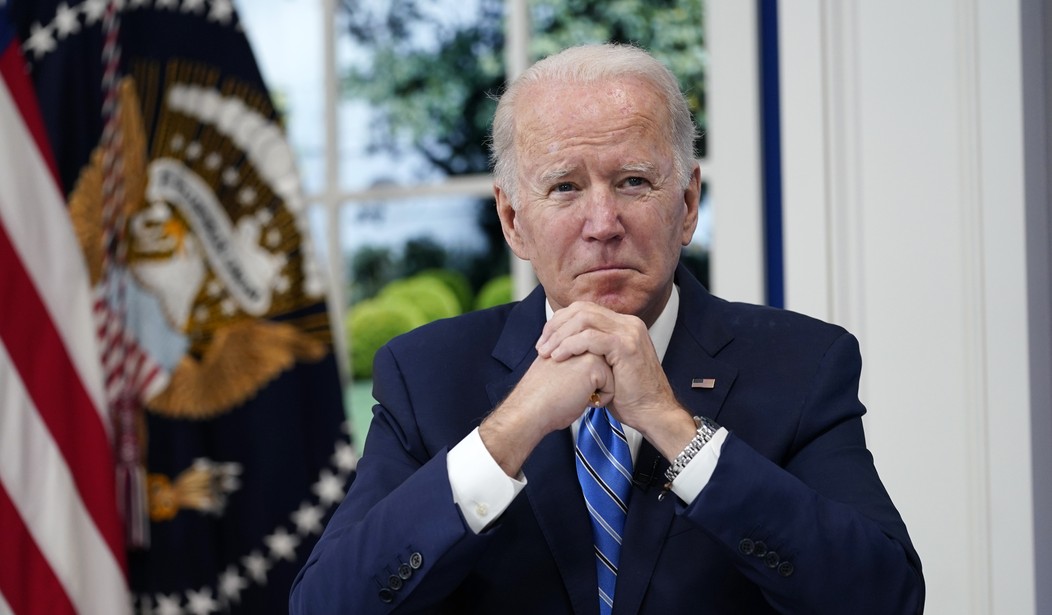Check out Spencer's post on this from earlier in the week, then read on. Gallup has been measuring partisan US voters' partisan identification over the course of the Biden presidency, and the trend speaks for itself. At the start of 2021, around when Biden was inaugurated, Democrats boasted a substantial nine-point national lead on this question, with just 40 percent of voters aligning with the Republican Party, or leaning in that direction. A few months later, the gap had tightened to six points; Democrats were holding their position, but the GOP's standing had risen a bit.
Months later, the parties were virtually deadlocked. And as we prepared to enter this election year, Republicans and leaners had taken a five-point lead – a net 14-point reversal in the span of a year:
“…a dramatic shift over the course of 2021, from a nine-percentage-point Democratic advantage in the first quarter to a rare five-point Republican edge in the fourth quarter.” https://t.co/6KgwmNvTgs
— Rich Lowry (@RichLowry) January 17, 2022
As Spencer pointed out, Gallup noted that the movement resulted in major electoral shifts last November: "These fourth-quarter shifts coincided with strong GOP performances in 2021 elections, including a Republican victory in the Virginia gubernatorial election and a near-upset of the Democratic incumbent governor in New Jersey. Biden won both states by double digits in the 2020 election." In Virginia, Biden's ten-point margin was reversed and eclipsed, with Republican Glenn Youngkin winning by two points. In New Jersey, the Democratic incumbent clung to power, but not before a major scare from an under-funded challenger. Biden won the Garden State 16 points. The leading Democrat's margin one year later collapsed by 13 net points, slightly more dramatic than Virginia's movement.
We are now less than ten months out from a national election. Much can and will happen between now and then, so over-confidence and complacency would be very foolish on the Right. But at the moment, all of the trends point in the direction of a significant red wave building. And as others are interpreting, this isn't just a matter of base enthusiasm or turnout advantage. Independents and moderates are leading the movement away from the Democrats and toward the Republicans:
It definitely seems like a shift across the board with the biggest movement coming in the middle.
— Josh Jordan (@NumbersMuncher) January 17, 2022
And that should scare the life out of Democrats because it's not MAGA but more moderate voters leaving for the GOP. pic.twitter.com/SfAfiqFug6
The percentage of self-identified Republicans increased slightly during 2021, and the share of self-identified Democrats has fallen off. By the end of the year, the two parties were tied at 28 percent among base supporters. But Democratic-leaning indies fell off by five percentage points, while GOP leaners swelled by four points. At the beginning of last year, Democrats enjoyed a four-point lead in the independent leaners category; by the end of the year, Republicans were up five. Another still-too-early piece of analysis: What to make of the pure, non-leaner independents? Which way will they break in the midterms? History suggests that the out party should be in prime position to win undecideds or late-deciders, as voters typically punish a new president's party at the ballot box in his first midterm election.
The way things are shaping up, that trend is very much on pace to hold this year – and it could be ugly for the Democrats. A new CBS News survey found that just 26 percent of Americans say things are going well in the country, so dissatisfaction is rampant. Democrats control all of Washington. The impulse and instinct toward change could be quite strong. Poll respondents also said that Biden isn't focused on the issues they care about (he just spent several news cycles last week ranting in a deranged manner about a low-priority "voting rights" canard). On the top issues of the economy in general, and inflation specifically, Biden's approval ratings are (38/62) and (30/70). He is also 30 full points underwater among independents:
(CBS News poll) Do you approve/disapprove of the job Biden is doing?
— Ryan James Girdusky (@RyanGirdusky) January 16, 2022
Overall: 44/56
Men: 41/59
Women: 47/53
Under 30: 42/58
65+ yrs old: 40/60
Dems: 81/19
Indies: 35/65
GOP: 11/89
Whites: 37/63
Blacks: 66/34
Hispanics: 58/42
Whites w/ college: 45/55
Whites w/o college: 31/69
How do you think independents will tend to vote when two-thirds of them disapprove of the Democratic president's job performance? Again, there's a long way to go, but virtually every sign imaginable is pointing toward a very rough cycle for Biden's team, which helps explain why dozens of them are deciding they're no longer interested in seeking re-election. I'll leave you with more grumpiness sign posts. Lots of bad vibes here for President Normalcy:
Recommended
?? https://t.co/l9Cu0IPMxF pic.twitter.com/UEmJFFrxez
— Guy Benson (@guypbenson) January 16, 2022
CBS pegs Biden's disapproval rating at 56 percent. Politico/MC finds exactly the same:
New Politico/Morning Consult poll:
— Josh Kraushaar (@HotlineJosh) January 19, 2022
Biden approval 40
Biden disapproval 56
GOP +1 on the generic ballot (42 R, 41 D)https://t.co/xSbRFPW7EH
The RCP average shows Biden sinking to just shy of 41 percent approval on average.

























